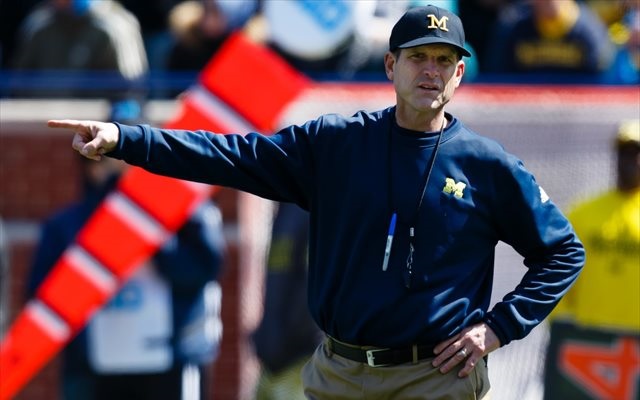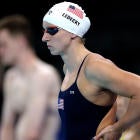We’ve reached the point in As the Satellite Camp Turns -- college football’s never-ending soap opera -- when a conference commissioner throws one of his athletic directors under the bus and drives over him. The AD's crime: not voting how he was supposed to vote.
“They’re really not supposed to use their judgment,” Pac-12 commissioner Larry Scott told ESPN earlier this week about voting representatives on the NCAA Council, such as UCLA athletic director Dan Guerrero. “It was a directed vote.”
Take a step back from the mind-numbing minutiae of whether satellite camps should or shouldn’t be banned. It’s an all-time meaningless topic that should have resulted in no ban or some sort of middle ground.
Instead, more than a year of back-and-forth public debate reached the point that Guerrero had to explain why he didn’t vote the way he was told to vote. If Guerrero were in Congress, he would likely get voted out of the Pac-12. I can’t tell if I’m watching the satellite camp debate or a contested Republican convention.
If nothing else, the satellite camp debate crystallizes that the NCAA governance system is still broken almost two years after the model significantly changed.
Shocking, I know.
All of this would be more amusing if there weren’t major issues for the NCAA to tackle on behalf of athletes: compensation, concussion safety rules, agents, time demands, transfer rules, health insurance and scholarship guarantees, just to name a few. If you can’t figure out which way you’re voting about coaches traveling to a couple summer football camps, how in the world are you going to pass meaningful change for players beyond cost of attendance?
Watching from afar, Jean Frankel shakes her head in frustration. Frankel was the NCAA’s consultant a couple years ago as the association gave more voting power to the SEC, ACC, Big Ten, Pac-12 and Big 12. She circled the country talking to Division I schools -- big and small -- about how to move forward and reform the NCAA.
They liked to call it the big tent, but they forgot you need a foundation to hold up a structure like that.
“The bigger question I don’t think we ever got to was what kind of governance does the NCAA really need to govern intercollegiate sports?” said Frankel, who no longer consults for the NCAA. “There are so many big issues out there that need real dialogue than some of these silly issues. The fact is they kind of ran out of time. They wanted to get cost of attendance done. There was a whole other level of detail that needed to be addressed for the autonomy group to have their own infrastructure and their own set of rules within the NCAA.”
The SEC, ACC, Big Ten, Pac-12 and Big 12 demanded the ability and autonomy to create their own rules and have more voting power on the NCAA Council. But in the process, they neglected to create a way for the schools within the five major conferences to reach consensus on issues. So ideas get floated without digging into the issues or a real way to build consensus.
Basically, the Power Five so far has created a smaller subset of NCAA dysfunction. Joy!
The Pac-12 schools voted 11-0 not to ban satellite camps with UCLA curiously abstaining. Then the Pac-12’s one council member (Guerrero) voted to ban the camps. Guerrero has since said he expected the vote to be tabled, found out it was moving forward, and once he realized that a ban would pass, voted in favor of a proposal that was better off for the Pac-12.
Sun Belt commissioner Karl Benson told Dennis Dodd of CBS Sports that his conference’s representative, Texas State AD Larry Ties, voted to ban satellite camps despite the majority of league officials supporting it. If Ties and Guerrero voted as directed, the NCAA ban would not have passed. The NCAA Board of Governors could still revisit the ban on April 28.
You know who didn’t vote on whether under-the-radar recruits can still be seen at satellite camps? The college athlete reps who supposedly provide a voice for those future players. Many current college football players expressed outrage when the ban came down.
Because satellite camps were exclusively a Football Bowl Subdivision issue, only council reps from the FBS conferences had votes that were weighted toward the Power Five. Former Northern Illinois soccer player Dustin Page, now in law school at Wisconsin, and Texas softball player Rachel Scott were there for the discussions but had no vote.
Page, who believes the NCAA system is better than it used to be but remains a work in progress, said both sides made persuasive arguments. If he had a vote, Page said he would have voted to keep satellite camps for the exposure players get.
"Having been part of the Mid-American Conference and now the Big Ten, I probably would have fallen more in line with the way those two conferences voted against the ban," Page said. "The assumptions were the SEC and ACC were trying to protect the talent closest to them. ... Rachel and I were in the room, but does that hold the same weight as a vote on that particular issue? Because that issue was specifically related to student-athlete welfare, it would have been nice to have a vote on that one.”
The Power Five can spin the cluster known as NCAA governance as a work in progress, and that’s true. But they demanded this power -- and they did so without a legitimate mechanism to discuss ideas themselves other than once a year at the NCAA convention.
The satellite camp debate turned into a juvenile back-and-forth through the media with coaches and administrators firing shots. At times, it felt like public comments were the only way for different sides to communicate with each other minus a mechanism for real dialogue.
“What’s caught me by surprise is the notion that there’s a lot of name-calling and finger-pointing,” SEC commissioner Greg Sankey told FoxSports.com. “It’s not a healthy byproduct of the legislative process.”
Whether you agree or disagree with the SEC’s push to ban satellite camps, Sankey is right about the tone. I suspect many people within the major conferences truly intended a couple years ago to create a somewhat better system for college athletes. They certainly did all they could to sell it while litigation and a unionization threat engulfed them.
But they better wake up to the reality that this is a political game and they’re running out of capital. So far, the Power Five’s agenda has largely been fueled by money, power, influence and visibility rather than the agenda once laid out for some bigger, broader vision to benefit college athletes.
NCAA president Mark Emmert, who recently got a contract extension, is even bogged down by a recent USA Today report that showed he still owes $49,000 to the University of Washington for an unpaid pledge from 2010 as university president. Washington endowed the scholarship at half its planned amount without the money from Emmert -- a perfect symbol of the half-baked ideas that have yet to get cooked in college sports. It’s easy to blame the NCAA office for the quagmire, but there’s only so much it can do. Money is power in college sports.
The Power Five, which is so wealthy that Georgia can pay Ludacris $65,000 for a 15-minute performance at a spring game, sold itself as the agent for change. These conferences had the bargaining chip (the NCAA Tournament) to get new voting authority, and now they can’t even figure out how to vote on something as inconsequential as satellite camps.
Frankel, the ex-NCAA consultant, said she still has high hopes the NCAA model she helped sell can work. But she’s also a realist. The five major conferences can use whatever rules they want to attach to their NCAA voting procedures, meaning a representative could vote based on his school’s self-interest or a conference’s self-interest. It’s not unlike how U.S. states operate in our political system with delegates.
“I worked at trade associations for years, and if associations don’t find a way to regulate themselves in a way that addresses the greater good -- and in this case, that’s the student-athletes’ interest -- they get regulated by the government,” Frankel said. “I predict if they’re not able to do a better job of coming together and reaching some consensus, it’s highly likely the NCAA won’t be together in five years.”
That should be the lasting message of As the Satellite Camp Turns. It's a meaningless soap opera no one can seem to turn off, but there are far-reaching consequences from this episode.
















